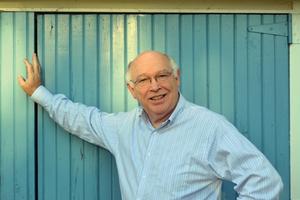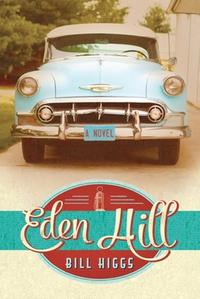
|
|
| photo: Elizabeth M. Higgs | |
Bill Higgs holds a B.A. in religion and social work, a Master of Divinity and a Ph.D. in Old Testament languages. Bill and his wife, author Liz Curtis Higgs, reside in Kentucky. Higgs's debut novel, Eden Hill, is published by Tyndale House (July 1, 2016).
On your nightstand now:
I usually have several books going at once. I just finished The Storytelling Animal: How Stories Make Us Human by Jonathan Gottschall, and Walter Isaacson's biography Steve Jobs is about half-done. I'm several chapters into Andy Weir's The Martian, and Small Victories by Anne Lamott is next in line.
And now for something completely different: since I'm teaching a class at my church on the biblical book of Amos next month, Peter Craigie's commentary Twelve Prophets is also there, with a couple of bookmarks stuffed between its pages.
Favorite book when you were a child:
It's hard to choose a favorite, given all the Hardy Boys and Tom Swift books I burned through (yeah, I was a nerd, and recently purchased a vintage collection of Hardy Boys). I was introduced to J.R.R. Tolkien in junior high school, so I'd have to say The Hobbit was the most memorable. Great story, and with a wonderful little storytelling wink to the reader. I read it again several years ago, and it still fired my imagination.
Your top five authors:
Currently David McCullough, Walter Wangerin, Annie Dillard, Anne Lamott and Wendell Berry. I find each of these authors extraordinarily intelligent and insightful.
Book you've faked reading:
Charles Dickens's A Tale of Two Cities when I was in high school. I read the first chapter, the last chapter and filled in the middle with Cliffs Notes. One of these days I'll get back to it, and see if death for Carton really was a "far, far better thing." Book you're an evangelist for:
Book you're an evangelist for:
Ragman and Other Cries of Faith by Walter Wangerin. The opening story, "Ragman," is one of the few pieces of writing to bring me to tears. Wangerin is an extraordinary writer whose words are art for the mind.
Book you've bought for the cover:
Coma by Robin Cook. Yes, I know it's a bit macabre, but something in the cover spoke to me. The novel turned out to be frightening but somewhat prophetic.
Book you hid from your parents:
The Catcher in the Rye by J.D. Salinger. What else? I grew up in the '60s, and everybody was reading it under the covers late at night with a flashlight. It's what you did to rebel and be cool. Aside from that, I don't recall getting any wilder or more rebellious after reading Holden Caulfield's story.
Book that changed your life:
In His Steps by Charles M. Sheldon. It's very dated now, and the questions it raises are likely not the most theologically correct, but it was given to me by a great-aunt at my high school graduation and a time of spiritual questioning in my life. It was ultimately more a springboard for examining my faith in other ways. Sadly, its premise of inquiring as to what Jesus might do in a particular situation has been watered down to rubber bracelets with WWJD on them--more a fashion statement than a credo.
Favorite line from a book:
Interestingly, or maybe not, it's from Margery Williams's children's book The Velveteen Rabbit: "He didn't mind how he looked to other people, because the nursery magic had made him Real, and when you are Real shabbiness doesn't matter." I discovered this book during my days in seminary, long before I became shabby, but it continues to speak to me as I get older.
But then again, children's literature is often more profound than books written for those of us who think we are mature.
Five books you'll never part with:
Bird by Bird and Traveling Mercies, both by Anne Lamott, Celebration of Discipline by Richard Foster, Pilgrim at Tinker Creek by Annie Dillard and All I Really Need to Know I Learned in Kindergarten by Robert Fulghum. Each of these books is written from a deep spiritual base, but from widely different theological perspectives. You'll have to pry these from my cold, dead hands.
Book you most want to read again for the first time:
Probably Aleksandr Solzhenitsyn's The Gulag Archipelago. I first read this as a college student back when the cold war was still a stark reality. Since then, relations have thawed, but many of Solzhenitsyn's political and social criticisms remain valid. Certainly worth a second read.
Book you have not read that you should:
As a writer who feels that humor is a powerful tool, I need to go back to the catalogue of Mark Twain, and also examine some of the writings and commentary of Will Rogers, H.L. Mencken and G.K. Chesterton. I often learn more from curmudgeons than from Pollyannas.

